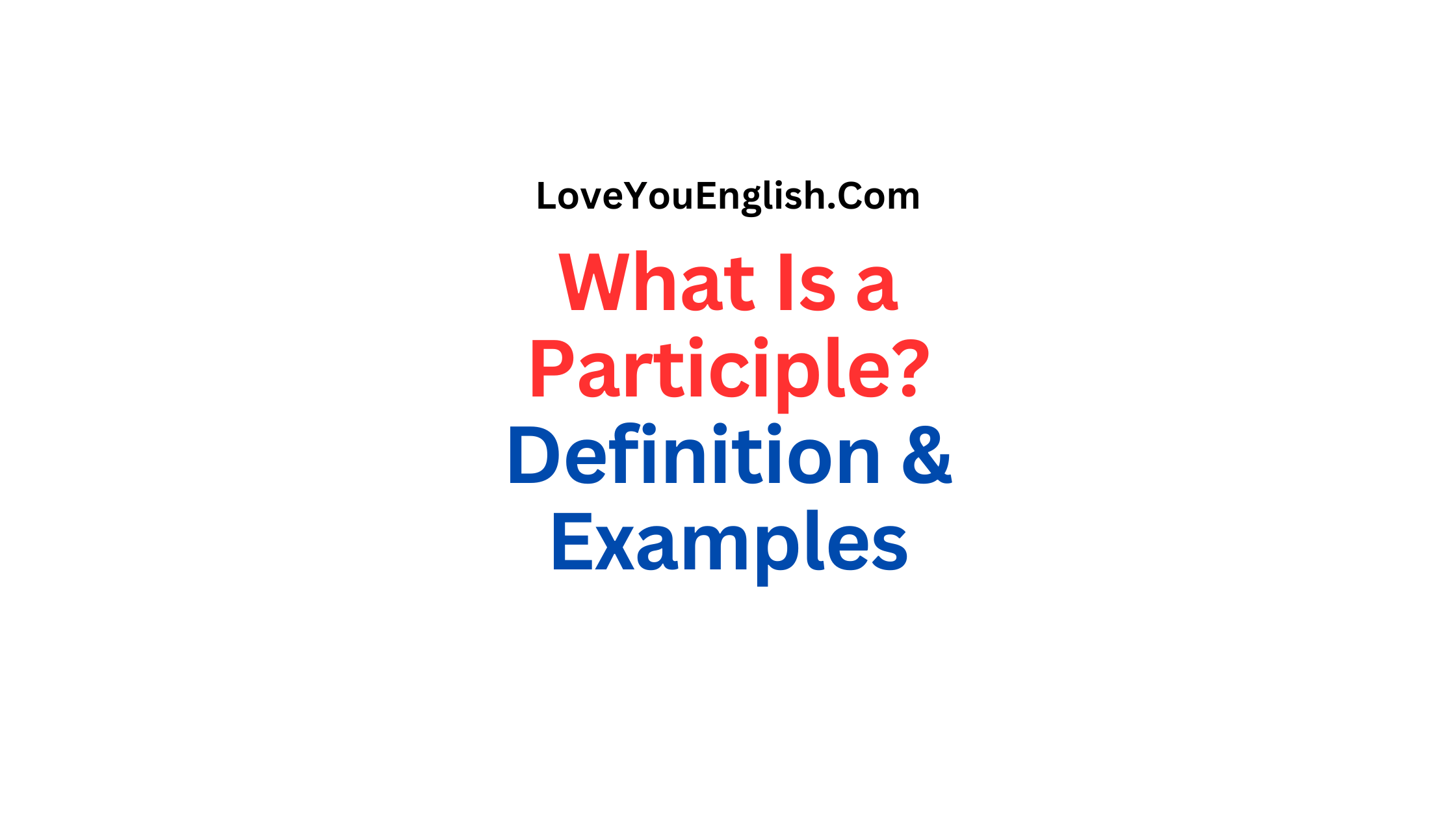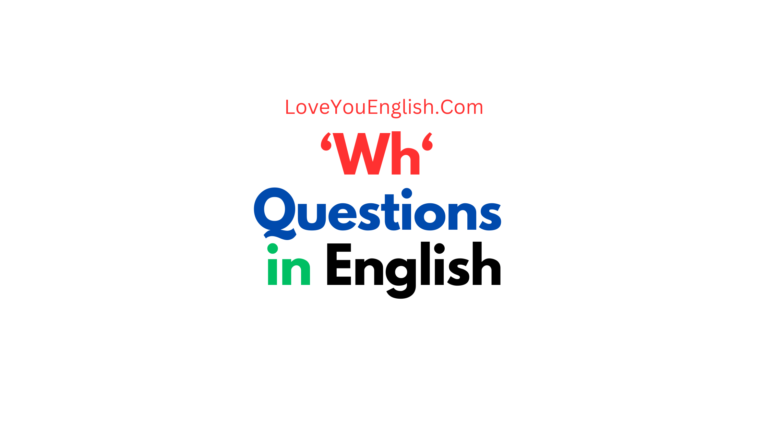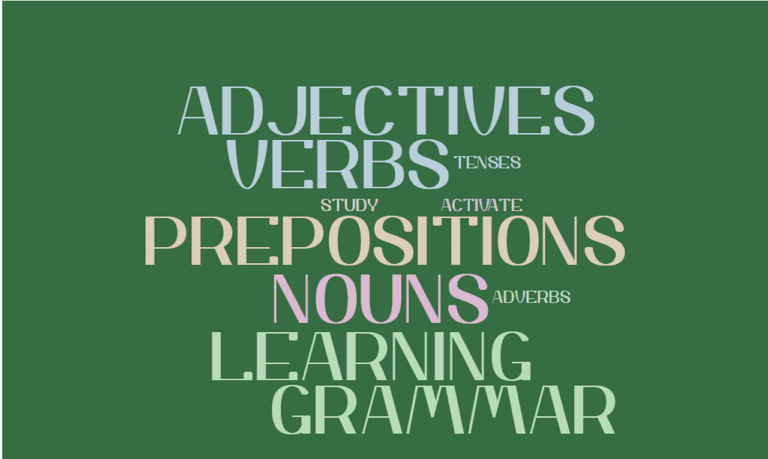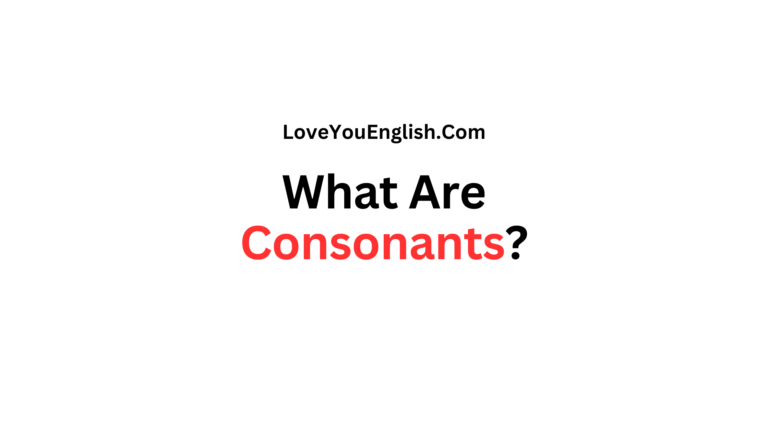What Is a Participle? Definition and Examples
What Is a Participle? Definition and Examples
Participles are super important in English grammar, but sometimes people don’t get them.
These cool words help make descriptions more interesting, explain tricky ideas, and make our language more colorful.
Whether you’re a student working on writing, learning English and figuring out grammar, or just someone who likes language, knowing about participles is really helpful for getting better at English.
In this post, we will explore participles, including what they are, the different types, how they are used, and mistakes to avoid.
I will simplify difficult ideas, give lots of examples, and give helpful advice for using participles well in your writing.
When you finish reading this, you will understand participles and how they work in English, so you can use them with confidence and accuracy.
What Is a Participle?
A participle is a word made from a verb that can act like an adjective or be part of a verb phrase.
This double duty is why participles are so useful and significant in English.
They let us use verb-type words to explain nouns or make intricate verb tenses that show detailed ideas about time and action.
There are two main types of participles in English:
- Present Participles
- Past Participles
Let’s explore each of these in detail.
Present Participles:
Present participles are formed by adding “-ing” to the base form of a verb.
For example:
- run → running
- sing → singing
- eat → eating
- dance → dancing
Present participles can be used in several ways:
a) As part of a continuous verb tense:
“She is singing in the shower.”
“They were eating dinner when I called.”
b) As an adjective to describe a noun:
“The running water soothed her nerves.”
“She watched the falling leaves with wonder.”
c) In a participial phrase to add information to a sentence:
“Singing softly, the mother rocked her baby to sleep.”
“Eating quickly, we managed to catch the train on time.”
Past Participles:
Past participles are typically formed by adding “-ed” to regular verbs, but irregular verbs often have unique past participle forms.
For example:
Regular verbs:
- walk → walked
- talk → talked
- play → played
Irregular verbs:
- sing → sung
- eat → eaten
- write → written
- go → gone
Read more grammar topics:
- Understanding the Difference Between “Since” and “For”
- Degrees of Comparison of Adjectives
- Has vs. Have: What’s the Difference?
- Difference Between “Which” and “That”
- What Is a Collective Noun? Examples & Definition
Past participles also have multiple uses:
a) As part of perfect verb tenses:
“She has sung in many concerts.”
“They had eaten before we arrived.”
b) In passive voice constructions:
“The book was written by a famous author.”
“The cake is baked fresh daily.”
c) As an adjective to describe a noun:
“The broken vase lay on the floor.”
“She admired the hand-painted mural.”
d) In a participial phrase:
“Exhausted from the long hike, we collapsed into our tents.”
“Written in elegant script, the invitation looked very formal.”
Understanding these basic forms and uses of participles is the foundation for mastering this aspect of English grammar.
Now, let’s explore more complex uses and nuances of participles.
Participles in Verb Tenses
One of the most important functions of participles is their role in forming various verb tenses.
Let’s examine how present and past participles contribute to different tenses:
Continuous Tenses (using present participles):
Present Continuous:
“I am writing a letter.”
Past Continuous:
“She was singing when I entered.”
Future Continuous:
“They will be traveling next week.”
“We have been working all day.”
Past Perfect Continuous:
“He had been studying for hours before the exam.”
Future Perfect Continuous:
“By next year, I will have been living here for a decade.”
Perfect Tenses (using past participles):
Present Perfect:
“I have finished my homework.”
Past Perfect:
“She had left before I arrived.”
Future Perfect:
“By next week, they will have completed the project.”
Passive Voice (using past participles):
Present Simple Passive:
“The house is cleaned weekly.”
Past Simple Passive:
“The letter was delivered yesterday.”
Present Perfect Passive:
“The car has been repaired.”
Future Passive:
“The new policy will be implemented next month.”
These tenses allow us to express complex ideas about the timing and duration of actions, as well as the relationship between different events.
Participles as Adjectives
When participles function as adjectives, they can add vivid and concise description to our writing.
Both present and past participles can be used in this way:
Present Participles as Adjectives:
- “The howling wind kept us awake all night.”
- “She has a very demanding job.”
- “The flowing river carved through the landscape.”
Past Participles as Adjectives:
- “The abandoned house stood at the end of the street.”
- “He served us freshly baked bread.”
- “The written instructions were clear and concise.”
Using participles as adjectives can make our writing more dynamic and engaging.
Instead of saying “The wind was loud and it kept us awake,” we can say “The howling wind kept us awake,” which paints a more vivid picture.
Participial Phrases
Participial phrases are groups of words that begin with a participle and function as an adjective, modifying a noun or pronoun in the sentence.
These phrases can add important information concisely and elegantly.
For example:
- “Exhausted from the long journey, the travelers collapsed into their beds.”
- “Singing her favorite song, Sarah walked down the street.”
- “Startled by the sudden noise, the deer bounded away into the forest.”
- “Driven by ambition, he worked tirelessly towards his goal.”
Participial phrases can appear at the beginning, middle, or end of a sentence:
- Beginning: “Waving goodbye, she boarded the train.”
- Middle: “The old man, smiling at the children, handed out candy.”
- End: “We watched the sunset, mesmerized by its beauty.”
When using participial phrases, it’s crucial to ensure that the participle clearly modifies the intended subject.
Misplaced or dangling modifiers can lead to confusion or unintentionally humorous sentences.
Common Mistakes with Participles
While participles are incredibly useful, they can also be a source of grammatical errors.
Here are some common mistakes to watch out for:
Dangling Participles:
A dangling participle occurs when the subject being modified by the participial phrase is not clearly stated in the sentence.
For example:
Incorrect: “Walking down the street, the trees were beautiful.” (This sentence suggests that the trees were walking down the street.)
Correct: “Walking down the street, I admired the beautiful trees.”
Misplaced Participles:
Similar to dangling participles, misplaced participles modify the wrong noun in a sentence:
Incorrect: “We saw a dog walking in the park wearing a red collar.” (This sentence suggests that the park was wearing a red collar.)
Correct: “We saw a dog wearing a red collar walking in the park.”
Overuse of Participles:
While participles can enhance writing, overusing them can make your prose feel cluttered or repetitive:
Overused: “Running quickly, jumping over obstacles, and dodging traffic, Sarah made her way to work, arriving just in time for her meeting, breathing heavily and collapsing into her chair.”
Better: “Sarah ran quickly to work, jumping over obstacles and dodging traffic. She arrived just in time for her meeting, out of breath as she collapsed into her chair.”
Confusing Present and Past Participles:
Sometimes writers mix up present and past participles, especially with irregular verbs:
Incorrect: “The sang melody lingered in the air.”
Correct: “The sung melody lingered in the air.”
Being aware of these common mistakes can help you use participles more effectively and avoid confusing or incorrect sentences.
Advanced Uses of Participles
As you become more comfortable with participles, you can use them in more sophisticated ways to enhance your writing:
Absolute Phrases:
An absolute phrase is a group of words that modifies an entire sentence and often includes a participle.
It’s set off by commas and adds extra information:
“The sun having set, we made our way back to camp.”
“Her work finished; Sarah decided to take a well-deserved break.”
Reduced Relative Clauses:
Participles can be used to create reduced relative clauses, which can make your writing more concise:
Full relative clause: “The man who is standing by the door is my uncle.”
Reduced: “The man standing by the door is my uncle.”
Stative Participles:
Some past participles can be used to describe a state rather than an action:
“I am interested in biology.”
“She was surprised by the news.”
Participles in Compound Adjectives:
Participles can be combined with other words to form compound adjectives:
“A well-written novel”
“Easy-going personality”
“Heart-stopping action”
Gerunds vs. Present Participles:
It’s worth noting that the -ing form of a verb can also function as a gerund, which is a verb form that acts as a noun.
While this isn’t strictly a use of participles, it’s an important related concept:
Gerund: “Swimming is great exercise.” (Here, “swimming” functions as a noun)
Present Participle: “The swimming fish darted through the coral.” (Here, “swimming” functions as an adjective)
Tips for Using Participles Effectively
Use participles to vary sentence structure:
Instead of always using full clauses, try incorporating participial phrases to add variety to your writing.
Choose the right participle for the job:
Consider whether a present or past participle better conveys your meaning.
Be mindful of overuse:
While participles can enhance your writing, too many can make your prose feel cluttered. Use them judiciously.
Check for clarity:
Ensure that your participles clearly modify the intended subject to avoid confusion.
Use participles for concision:
Participial phrases can often replace longer clauses, making your writing more efficient.
Experiment with placement:
Try placing participial phrases at the beginning, middle, or end of sentences to see what works best for your meaning and rhythm.
Read your writing aloud:
This can help you catch awkward constructions or misplaced participles.
Conclusion
Participles are super useful in English because they help us say complicated stuff in a short way and make our writing more interesting.
If you learn about the different kinds of participles, how to use them, and what mistakes to avoid, you can get really good at English grammar.
Just like anything else, getting good at participles takes practice. Watch how good writers use participles and try using them in your own writing.
Eventually, you’ll get a feel for when to use participles to make your writing more exciting, lively, and clear.
Whether you’re writing an essay, a story, or just trying to talk better every day, knowing participles well will help you.
So, keep practicing, stay curious about words, and have fun using participles in your writing.
With time and work, you’ll be able to use these cool words confidently and skillfully.







